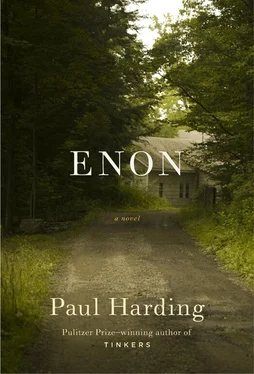Paul Harding - Enon
Здесь есть возможность читать онлайн «Paul Harding - Enon» весь текст электронной книги совершенно бесплатно (целиком полную версию без сокращений). В некоторых случаях можно слушать аудио, скачать через торрент в формате fb2 и присутствует краткое содержание. Жанр: Современная проза, на английском языке. Описание произведения, (предисловие) а так же отзывы посетителей доступны на портале библиотеки ЛибКат.
- Название:Enon
- Автор:
- Жанр:
- Год:неизвестен
- ISBN:нет данных
- Рейтинг книги:3 / 5. Голосов: 1
-
Избранное:Добавить в избранное
- Отзывы:
-
Ваша оценка:
- 60
- 1
- 2
- 3
- 4
- 5
Enon: краткое содержание, описание и аннотация
Предлагаем к чтению аннотацию, описание, краткое содержание или предисловие (зависит от того, что написал сам автор книги «Enon»). Если вы не нашли необходимую информацию о книге — напишите в комментариях, мы постараемся отыскать её.
Powerful, brilliantly written, and deeply moving Paul Harding has, in Enon, written a worthy successor to Tinkers, a debut which John Freeman on NPR called "a masterpiece." Drawn always to the rich landscape of his character's inner lives, here, through the first person narrative of Charlie Crosby (grandson to George Crosby of Tinkers), Harding creates a devastating portrait of a father trying desperately to come to terms with family loss.
Enon — читать онлайн бесплатно полную книгу (весь текст) целиком
Ниже представлен текст книги, разбитый по страницам. Система сохранения места последней прочитанной страницы, позволяет с удобством читать онлайн бесплатно книгу «Enon», без необходимости каждый раз заново искать на чём Вы остановились. Поставьте закладку, и сможете в любой момент перейти на страницу, на которой закончили чтение.
Интервал:
Закладка:
I reached across the couch and snapped on the lamp, which was a contraption assembled in someone’s workshop sixty or seventy years before, by the look of it. It was a pewter tankard fitted with a cord and light socket and shade harp. The lampshade was sepia-colored and printed with botanical drawings labeled in French: Hypopétalie, 348. Anémone Hépatique, 304. Artichaut . Some of the words were chopped off at the ends, where the paper they were printed on had been cut and fitted into the shade: — orollie, svnanth —. The drawings and tallies reminded me of the pajama bottoms in which Kate had been cremated. The lamp had ended up in our living room after my grandmother died. It wobbled and clanked whenever it was turned on or off, and I could never figure out how to tighten it. Susan and I had been convinced that it would surely burst into flames and incinerate the house some afternoon, when it had been accidentally left on for the day while no one was home. Despite our certainty that the lamp was probably lethal, we used it all the time, with low-wattage bulbs, because it gave a pleasant golden glow to the room, almost like a cheap surrogate for a fireplace. Susan sometimes said, “It just hides the dirt and makes the worn-out furniture look antique, but that’s okay.”
I cupped my hand around the pewter base of the lamp because the morning was so cold and I thought that the pewter would be cold, too. The cold pewter made me think of the tankard stripped of its lamp hardware and sitting outside in the frosted grass in the light of dawn. The tankard would have frost on it, too, and the pewter would contract in the cold, buckle and split and release a sharp, sour metallic odor. The tankard was silvery gray and the frozen grass looked blue, like pewter made with lead, and the clouded sky behind it looked like layers of pewter alloyed with copper and bismuth and lead. Pewter is mostly made of tin, and I imagined my great-grandfather for a moment, soldering the breaks in the clouds with patches of tin. And I thought of Kate’s cremation urn, made of pewter, in the frost-tightened ground on the other side of the village. Choosing a pewter urn for my daughter’s ashes might have been the persistence of a trivial family conceit, which I remembered my grandmother invoking with the refrain “We prefer the classic colonial furniture,” which struck me at that moment as bearing witness against its own truth. The lamp now seemed surely to have been made by some company in New Jersey that manufactured cheap, ersatz colonial souvenirs, sold to credulous, working-class dupes on their crummy local weekend vacations to fake pilgrim villages, the sort through which I had suffered as a kid and romanticized as an adult. I felt terrible for my grandparents, and love for them, and deeper loyalty than ever to them for what they had given to my mother and me. And I felt both abashed and comforted by the fact that I had maybe deepened the connections between myself and my grandparents and my daughter, as best as I could, in an inadvertent, backhanded way, by having been susceptible to the notion of being a colonial son during the subdued sales pitch for my dead daughter’s urn rather than the whelp of mongrels.
In the kitchen, I saw that I’d run out of fresh coffee, so I dug around in the freezer and found an old, half-full can from what must have been a couple years earlier. The can was so cold that my hand stuck to it. I wondered what sort of metal it was made from, whether it was tin or aluminum or something else, and that made me think of the pewter tankard and Kate’s urn. Digging up the cold, grainy coffee with the yellow plastic scoop made me think of Kate’s ashes and for a moment the coffee became her ashes and I was performing the suburban variation of a ghastly pagan ritual, abominable to all good folk, during which boiling water was percolated through the ashes of the dead, her essence imparted into the water and absorbed by the person who drank the cannibal tea. As outrageous as the idea was, as shameful and gruesome, it also seemed like something that, were I to read about it in the history of an ancient culture, or to see it in a documentary about an isolated population deep in the Amazon, might seem perfectly appropriate, profound even, even blessed, and I considered that, after all, the only thing missing to ennoble the idea from morbid daydream to sacred rite was my consent, my belief. I sat at the kitchen table listening to the coffeemaker burble and steam, and then I poured the coffee into the least dirty mug I could find in the sink. Foolish as it was, I could not bring myself to spoon any sugar into the coffee. I didn’t have any milk, but that seemed as if it would have been blasphemous, too, and I swallowed the scalding drink black, strong and bitter.
The coffee helped clear my head and I thought about the pills. Dr. Winters would not give me another prescription. I did not want to get hooked but I was also not ready to wean myself from the schedule I’d adopted. As much as I conserved the pills and tried to use them to augment the alcohol, I began to panic at the thought of spending nights without the consolations of floating on that placid, narcotic-kissed ocean. I emptied the linen closet and the medicine cabinet and the cabinet under the sink in the bathroom, where I knew there was nothing besides the toilet brush and containers of bathroom cleaner, praying for some cough syrup with codeine in an impossible, crusted, brown plastic bottle from a long-ago bout of bronchitis, or muscle relaxants from a strained neck muscle, or painkillers from a root canal. I had the hope that my own simple will might be able to invoke the spontaneous appearance of a moldy pill or two, in some dark, dusty corner at the back of a closet or cabinet, as if it might be just a matter of concentration, as if, once I could take the idea and turn it in just the right way, to just the right degree, almost in the way a thief cracks the combination of a safe, can feel the tumblers drop with a minuscule twitch of the dial, I could transform the idea of a pill into an actual pill, could parlay my desire for a pill into the fact of a pill.
I spent the better part of the day crawling around closets and wriggling under beds and moving chairs and sofas, concentrating on the appearance of a miraculous dose. After scouring each room, I sat on the floor with my back against a wall, sweaty, more tired and more irritated. I’d eaten nothing all day except for the cup of ancestral coffee. But Kate was not your ancestor, I told myself. She was your heir. It must be blasphemy to assimilate the spirit of your own offspring. It should have been Kate, years from now, a grown woman, drinking the water steeped in your ashes.
By three-thirty in the afternoon, the sun was already lowering into the trees. The last of my hopes for finding drugs in the house evaporated with the day’s light. The cold that had poured into the village from the north the previous night had settled in and the house snapped and popped as it contracted in the frigid air. You are just not going to not have your medicine tonight, I thought. Although I’d considered it three or four times, I lacked the nerve to rebreak my hand. I’d thought about laying it on the kitchen table and clobbering it with a saucepan or a rubber mallet, or even holding it under my butt and sitting down on a wooden chair as hard as I could, but whenever I decided to go get the toolbox or pulled out a kitchen chair and felt the hard wooden seat, I became queasy and my nerve failed. But where can you find some pills? Where? I asked myself. And I answered, You can get some from Frankie !
Frankie Shuey, a.k.a. Frankie the Dope, Hanky Frankie, Frankie Freak, or just Dumbass Frankie, was a kid I’d painted with one summer when I’d worked with Gus the ex-con and a few years later hired to work on a crew I put together myself. He was a tall, babyish, boneless-looking guy with long curly red hair that he let fall in front of his face so you couldn’t really ever see his eyes, like a big sheepdog. He must have had adenoid problems, too, because he always had a stuffy nose and could apparently breathe only through his mouth. He was a slow, sloppy painter and ended every shift covered in paint. It got all over his clothes and his arms and his hands and his legs, and caked in his hair, too. He took a lot of grief from the other guys on the crew, but everyone liked him and he was a good sport about the guff he got. He also could get just about any drug anyone wanted, just about any time anyone wanted it. Three of the other guys on the crew moved back and forth from the North Shore in the summer to Colorado in the winter. In the winter, they went to Vail and skied all day and took jobs as dishwashers in restaurants at night. In the summer, they painted houses during the days and worked as crew members on the sloops that raced out of the yacht clubs on the coast on week-nights and weekends. They were intense, wiry guys anyway, but they all kept going by sniffing tons of cocaine and popping any kind of speed they could get their hands on. Frankie got them most of their coke and bagfuls of amphetamines, too.
Читать дальшеИнтервал:
Закладка:
Похожие книги на «Enon»
Представляем Вашему вниманию похожие книги на «Enon» списком для выбора. Мы отобрали схожую по названию и смыслу литературу в надежде предоставить читателям больше вариантов отыскать новые, интересные, ещё непрочитанные произведения.
Обсуждение, отзывы о книге «Enon» и просто собственные мнения читателей. Оставьте ваши комментарии, напишите, что Вы думаете о произведении, его смысле или главных героях. Укажите что конкретно понравилось, а что нет, и почему Вы так считаете.












